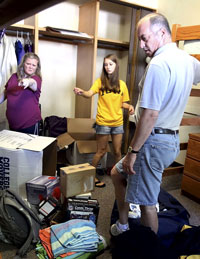

|
Dear Bobcat parent and family members,
Often, when you hear from me, the focus is on approaching deadlines, events, campus resources and other functional elements of our MSU community. But sometimes -- like today -- I touch upon topics related to our students' transition from adolescence into adulthood. College changes a student's relationships with their parents and family, and maybe today's topic is timely for you amid the many emotions that come with having a student head off to college, whether this is your first time experiencing that transition or not.
A favorite author of mine, Jeffrey Arnett, coined the term "emerging adulthood," and since most of our student body here at MSU is between the ages of 18 and 25, it's an apt descriptor. Dr. Arnett describes this distinct period in a young person's life as uniquely dynamic and full of expansive possibility:
"Having left the dependency of childhood and adolescence and having not yet entered the enduring responsibilities that are normative in adulthood, emerging adults often explore a variety of possible life directions in love, work and worldviews. Emerging adulthood is a time of life when many different directions remain possible, when little about the future has been decided for certain, when the scope of independent exploration of life's possibilities is greater for most people than it will be at any other period of the life course."
His seminal article on this topic was published in American Psychologist in 2000 and is still very relevant. I encourage you to check it out -- it may remind you of your own departure from home as a young person. And on top of all that, Dr. Arnett will be speaking at our upcoming Parent and Family Weekend in October! More information on that below.
So, how does this concept of emerging adulthood impact the relationship between a student and their parents and families? On a positive note, research shows that parent and child relationships often improve during their college years. A great article from The Atlantic titled "How College Changes the Parent-Child Relationship" describes some of the many factors that lead to those adjustments, and notes that just as these changes are crucial in a young person's development, it's equally important for parents to evolve as well. You are not simply authoritative figures and problem-solvers anymore; you may take on the role of adviser to your student as they begin their "exploration of life's possibilities," in Arnett's words.
But you do not take on that role of adviser and support system for your student alone. Another area that develops during emerging adulthood is recognizing when you need help and having the maturity to seek assistance, and at MSU we are committed to providing that support. September is Suicide Prevention Month, and we have resources available 24/7 to be there for any members of our community who find themselves in need. I'd like to draw your attention to two of them in particular.
- Last year, Montana launched the Montana 988 Suicide Prevention and Mental Health Crisis Lifeline. Montana 988 is part of the National 988 Suicide and Crisis Lifeline network of over 200 local, independent crisis centers. They are prepared to assist anyone experiencing mental health-related distress or a suicidal crisis 24 hours a day, seven days a week.
- Here on our campus, we also have a unique resource called a CARE Referral, which alerts us in the Office of the Dean of Students. Students, faculty and staff who are worried about the well-being or safety of a member of our community can submit CARE Referrals at any time, and if you are ever concerned about the welfare of your student, you are also welcome to do so. Sometimes people cannot or will not ask for support, so informing us of your concern may be a critical factor in getting them the support they need.
MSU President Waded Cruzado sent a communication on Sept. 5 outlining further suicide prevention resources at MSU. You can read that communication here and can see a full directory of mental health and crisis resources on the MSU Assist webpage.
While it may seem minor, another vital self-care resource is the annual flu shot. MSU Student Health Services will hold walk-up flu vaccine clinics scheduled for Sept. 27, Oct. 10, Oct. 26 and Nov. 14 . If students can't make it to a walk-up clinic, they can call 406-994-2311 to schedule an appointment for their flu vaccination. Please encourage your student to get a flu shot; last year, Student Health Services administered over 1,000 doses of the flu vaccine on our campus, and it is a key part of keeping our community healthy for all the great things there are to do at MSU.
One last reminder: It's almost time for our 2023 Parent and Family Weekend, scheduled for Oct. 13-14, and we can't wait to see you on campus. Don't forget to register in advance so you don't miss any updates leading up to the event. There will be a lecture by Dr. Jeffrey Arnett to kick off the weekend, as well as a Bobcat Parent and Family Breakfast, a special Parent and Family Tailgate and a slew of Bobcat athletic events including volleyball against Idaho and football against Cal Poly. For the full schedule of events and to register, visit the 2023 Parent and Family Weekend webpage. We hope to see you in Bozeman!
See you soon,

Matthew R. Caires
Dean of Students
P.S. While your student is here at MSU, we invite you to learn about our Bobcat Family Fellows program, which provides opportunities for you to develop relationships with other families who want to help sustain MSU programs and other initiatives that enrich the student experience. For more information contact Moira Keshishian with the MSU Alumni Foundation.